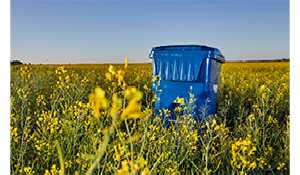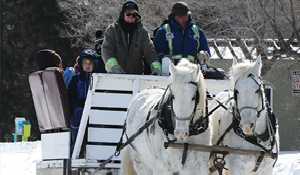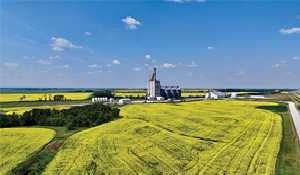Wagantall questions the federal government’s reducing emissions plan for Canada’s agriculture sector
August 3, 2022, 4:52 pm
Sierra D'Souza Butts, Local Journalism Initiative Reporter


Cathay Wagantall, MP for Yorkton-Melville, Sasktchewan shared her thoughts regarding the federal government’s plan for reducing emissions arising from the application of fertilizer in Canada’s agriculture sector.
Outlined in the Government of Canada 2030 Emissions Reduction Plan (ERP) stated a national target to reduce levels of greenhouse gas (GHG) emissions, arising from fertilizer application by 30 per cent below 2020 levels by 2030.
“I’m hearing farmers in the southeast are facing so many challenges already and this is just another one,” Wagantall said.
“With the increased tariffs on the fertilizer and now the government telling them they have to cut back an arbitrary number in regard to the amount of fertilizer they use when it’s not connected to any other metrics, is concerning.
“Their ability to further cut back and still maintain the amount of food when the food security issue is huge now, more than it has ever been. This will impact farmers ability to create large crops, the costs of inputs are increasing and at the same time they will end up with less product.
“There is a great deal of concern of how it will go no question, and they’re reducing it by 30 per cent by 2030, that’s the target for now, but we have heard as high as 75 per cent by 2050.
“Of course you ask yourself what is motivating this decision and it’s not just our prime minister, you’re seeing this internationally with the Netherlands as well. It’s destroying the ability of the major agriculture producers in the world to provide this need.”
It is unclear why the government decided on the figure of 30 per cent as their national target for reducing fertilizer usage, Wagantall said.
“We’ve met with Fertilizer Canada, they’ve crunched all the numbers and have asked why this number, and there’s no explanation of it, other than it will help the government get to lower emissions by 2030,” she said.
“We have to do our part which is what we’re hearing, I was at Ag in Motion last week, I understand the minister was there for a short time, but how they can’t see the damage they’re doing versus what incredible innovation is taking place. Farmers have enough to stress without adding this on top of other burdens.”
The federal government’s ERP also focuses on putting a cap-and-trade system (under the Canadian Environmental Protection Act) that sets a regulated limit on emissions from the oil and gas sector. Although the oil and gas sector accounts for 27 per cent of Canada’s 2020 GHG emissions, the agriculture sector accounts for 10 per cent.
Wagantall was asked why she thinks the federal government is targeting the agriculture sector to help reduce Canada’s overall GHG emissions.
“A country can’t really function without fuel and food, I have no explanation for that. Obviously they think it’s crucial to their mandate, but it’s contrary to how hard everyone has been working to do this pro-actively,” she said.
“The whole issue is a huge environmental issue, everyday Canadians are at a place where they want to see and take good care of our environment, but it’s not sustainable. It’s a push with oil and gas, obviously a push to what they call green energy sources and some of them definitely are, small nuclear reactors stuff like that, but there’s enough proof that they’re willing to share that these new methods are more environmentally friendly. They’re not presenting the actual environmental costs of moving into those other particular producing energy.”
Wagantall stated how these national targets may impact Saskatchewan and Canada’s overall economy.
“Currently the state we were in, as the lack of investment in our country prior to Covid, I thought was absolutely frightening. It just gets worse and worse because they’re limiting our ability to be productive as a nation,” Wagantall said.
“In Saskatchewan we’re an exporting province, our population is small for what we produce. We have the capacity, with high quality products, to make a difference in the world. From a different route, we would deal with a lot of the issues around energy security, food security, and environment protection. This to me does not appear to be about those things.”
Recently the federal government backed down on a proposal to require warning labels on ground beef and poultry after receiving public outcry for an exemption.
Wagantall was asked if the government could change their approach on these emissions caps if the agriculture industry reacts in a similar manner.
“They’re picking their winners and losers and creating crisis then appearing to listen, which they did in that circumstance and responded to reason there,” she said.
“Obviously their approach on reducing fertilizer is going to impact our ability to produce food, and impact our livestock industry as well. We just look at it and there’s so many things where there’s not a solid rationale that focuses on improving the welfare of the citizens.”
Wagantall said she is not sure if reducing emissions in Canada’s agriculture sector will make a difference globally.
“That’s an argument I bring to the classroom all the time to ask students. We have informed them that it’s good to care, and we do too, but we are such a small sliver of the overall picture. If Canada was to do this, what is that impact on the international need for control of greenhouse gasses?
“If we took away our entire economy, which it feels like is happening, would that end this climate change crisis? I tell them we need to continue what we’re doing without tax measures, or regulations being forced on us by the government, to continue what we’re doing, but let’s sell to the world our capabilities, our carbon capture, the way we apply our fertilizer.
“At AG in Motion, I was able to see the innovation from a drone from a Saskatchewan farmer who’s developed the ability for the lightweight drones to carry a crop spray and apply it to particular weeds. The emissions from that are significantly less in that method, developed to where they can make it financially feasible. It just shows that we’re motivated already without this draconian approach to somehow save the world.”



































